|
|
|
Sort Order |
|
|
|
Items / Page
|
|
|
|
|
|
|
| Srl | Item |
| 1 |
ID:
151638
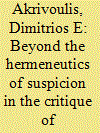

|
|
|
|
|
| Summary/Abstract |
Realist and Marxist critiques of humanitarian intervention are distinctively materialistic in scope. The IR literature has already described this scepticism as a ‘hermeneutics of suspicion’, a term associated with the work of Paul Ricoeur, which aims to unearth the intervenors’ material and geopolitical interests hypocritically hidden behind the pretext of humanitarianism. The article first notes the decontextualised misappropriations of the term as an iconic and omnipotent instrument of doubt, as well as the limitations of the social constructivist response on the matter. By contextualising Ricoeur’s hermeneutics of suspicion as developed in his life work, the article then calls for an extension of critique from a hermeneutics of suspicion to a hermeneutics of naïveté. Applied in the critique of the ideology of humanitarian intervention, the article thus calls for a shift of focus from the examination of the distorting (Marxism, realism) and legitimising (social constructivism) functions of this ideology to its integrating function that has allowed the evocation of humanitarian principles as international norms, and uncritically vindicates this arrangement. The article proposes that this hermeneutical detour could allow critique to proceed to a greater analytical depth, opening up a set of critical questions.
|
|
|
|
|
|
|
|
|
|
|
|
|
|
|
|
| 2 |
ID:
123537
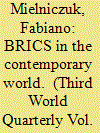

|
|
|
|
|
| Publication |
2013.
|
| Summary/Abstract |
This paper aims to address the reasons why the acronym brics is moving from being an easy marker to guide foreign investors interested in emerging markets to denoting an important political group of countries determined to promote major changes in international relations. Theoretically the paper draws on social constructivism to demonstrate that the changing identities of brics (Brazil, Russia, India, China and South Africa) can be treated as the main cause of the convergence of their interests in the international arena. Through a detailed analysis of these countries' statements at the opening sessions of the UN General Assembly from 1991 to 2011, their social claims about themselves are retraced and the way they have judged the international sphere in which they engage is captured, in order to demonstrate the changing character of their identities. These new identities, it is argued, created the opportunity for converging interests, which explains the emerging political structure of brics . The paper concludes that, after four major summits and a significant number of wide-ranging low-level meetings, brics might be considered one of the major long-lasting forces shaping the new architecture of international relations in the 21st century.
|
|
|
|
|
|
|
|
|
|
|
|
|
|
|
|
| 3 |
ID:
178457
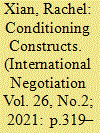

|
|
|
|
|
| Summary/Abstract |
Political psychology and social constructivism exist in an “ideational alliance” against realism; however, both have overlooked behavioral conditioning, the basis of animal learning. Through six stages situated in international negotiation behaviors, the theory of Conditioning Constructs shows how behavioral conditioning can take parties from specific to diffuse reciprocity, rationalist to constructivist cooperation, and crisis to durable peace. In stages 1, 2 and 3, parties use negotiated agreements to exit prisoner’s dilemmas, continuously reinforce cooperation during agreement implementation, and satiate to rewards as initial implementation finalizes. In stages 4, 5 and 6, parties receive fresh rewards with new negotiations, undergo intermittent reinforcement with periodic agreements thereafter, and finally attribute cooperative behavior to actor constructs. Conditioning Constructs demonstrates that agency is possible in socially constructed structures through willful participation in conditioning through negotiation; and that, while Anatol Rapoport’s tit-for-tat strategy is suited to initial cooperation, intermittent reinforcement better preserves late-stage cooperation.
|
|
|
|
|
|
|
|
|
|
|
|
|
|
|
|
| 4 |
ID:
077427
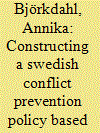

|
|
|
|
|
| Publication |
2007.
|
| Summary/Abstract |
The story of how conflict prevention became an integral and legitimate part of Swedish foreign policy illustrates the relationship between successful practices and powerful ideas. This article suggests that the demonstration of an idea in practice empowers the idea and contributes not only to its selection, but also to its framing and institutionalization within foreign policy. Hence, the article sets out to explore the relationships between practice, ideas and foreign policy. Adopting a social constructivist perspective, the article provides a detailed process-tracing of the construction of a Swedish conflict prevention policy and concludes that conflict prevention was a powerful idea because it was morally appealing and persuasive as well as successfully demonstrated in practice. In fact, preventive practices spearheaded the advancement of the conflict prevention idea. In addition, the idea resonated with the Swedish foreign policy elite, with commonly held values and with the traditional Swedish foreign policy that stressed internationalism and solidarity
|
|
|
|
|
|
|
|
|
|
|
|
|
|
|
|
| 5 |
ID:
188472
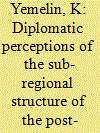

|
|
|
|
|
| Summary/Abstract |
IN CONTRAST to the rather clearly defined state borders, the division of the ecumene into regions and subregions is relative and highly speculative. It is implemented at the level of individuals and social groups, as well as states and political blocs. The classics of critical geopolitics, who insist on the socially conditioned basis of the perception of political and geographical space, argue that the drawing of boundaries may be both "conceptual and cartographic, imaginary and actual, social and aesthetic."
|
|
|
|
|
|
|
|
|
|
|
|
|
|
|
|
| 6 |
ID:
079131
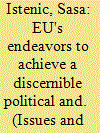

|
|
|
|
|
| Publication |
2007.
|
| Summary/Abstract |
Regionalism and interregionalism have become tools for diplomacy in the post-Cold War era. Successful European integration has heightened the European Union's (EU) desire to become a more effective global actor in international security. The Taiwan Strait is one of the most dangerous flash-points which might trigger a war in Asia. Escalation of the crisis in the Taiwan Strait would undeniably have severe economic, political, and perhaps even military implications for the EU. In the light of the EU's emerging regionalism with East Asia and its efforts to achieve a discernible political and security role in the region, there is an increasing awareness in the EU of the need for it to develop its own security perspective on China and to form its own approach toward the contentious cross-Strait issue
|
|
|
|
|
|
|
|
|
|
|
|
|
|
|
|
| 7 |
ID:
140483
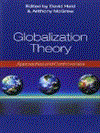

|
|
|
|
|
| Edition |
1st ed.
|
| Publication |
Cambridge, Polity Press, 2007.
|
| Description |
xi, 273p.pbk
|
| Standard Number |
9780745632117
|
|
|
|
|
|
|
|
|
|
|
|
Copies: C:1/I:0,R:0,Q:0
Circulation
| Accession# | Call# | Current Location | Status | Policy | Location |
| 058285 | 327.1/HEL 058285 | Main | On Shelf | General | |
|
|
|
|
| 8 |
ID:
086553
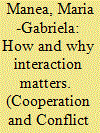

|
|
|
|
|
| Publication |
2009.
|
| Summary/Abstract |
The aftermath of the Cold War has brought a shift in the West's position on the acceptance and promotion of international human rights standards in developing countries. In this context, the Association of Southeast Asian Nations (ASEAN) member countries challenge the West's position based on two contradictory principles - comprehensibility and cultural embedment of human rights. In this article, I argue that interactions with regard to human rights involving state and non-state actors in ASEAN have become part of the process of regional identity formation. How ASEAN has responded to external pressures in terms of compliance with international human rights norms, and how it has developed its own normative and procedural approach to human rights at the regional level, are inherent in the dynamics of `Self' definition. A mixed pattern of `rhetorical' and `communicative action' explains how interaction has led to different phases - differentiation, affirmation, contestation and re-orientation - in the dynamics of `Self' definition of ASEAN with regard to human rights.
|
|
|
|
|
|
|
|
|
|
|
|
|
|
|
|
| 9 |
ID:
082692
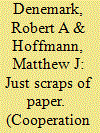

|
|
|
|
|
| Publication |
2008.
|
| Summary/Abstract |
Despite its importance in the global system, the literature provides little guidance on how treaty-making emerged as a well-accepted practice. In either assuming the appropriateness of treaty-making (and then analysing design) or treating treaties as strategic choices in the pursuit of gains (without analysing how treaties came to be a way to pursue gains), the current literature discounts the emergence and evolution of treaty-making. This lacuna contributes to a biased view of treaty-making as the epiphenomenal result of specific, ahistorical factors, rather than as a patterned, historical practice. We contend that the evolution of the practice of treaty-making is significant for questions of design/compliance, the future of multilateral interaction and global order. In addressing this concern, we pursue two linked goals. The first is self-consciously descriptive. We introduce a dataset of multilateral treaties that provides a novel picture of treaty-making across time, space and issue-areas. The second goal is explanatory. We develop and test a social constructivist and path-dependent explanation for the patterns of treaty-making evident in the data, especially 150 years of exponential growth, the spread of treaty-making across multiple issues and the diffusion of the practice across the world.
|
|
|
|
|
|
|
|
|
|
|
|
|
|
|
|
| 10 |
ID:
117777
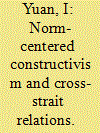

|
|
|
| 11 |
ID:
112786
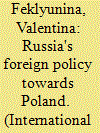

|
|
|
|
|
| Publication |
2012.
|
| Summary/Abstract |
Russia's relations with Poland in the post-Soviet period have been greatly affected by their divergent historical narratives that have shaped their dominant identities and have been further promoted by the political elites to maintain these identities. However, Moscow's attempts to project a more positive image in Poland in recent years have involved re-articulating some elements of the official narrative. Drawing on social constructivism, this article presents a theoretical framework that can be applied to an analysis of Russia's foreign policy, and illustrates its benefits by examining Russia's policy towards Poland.
|
|
|
|
|
|
|
|
|
|
|
|
|
|
|
|
| 12 |
ID:
145163
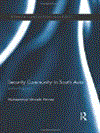

|
|
|
|
|
| Publication |
Oxon, Routledge, 2013.
|
| Description |
ix, 160p.hbk
|
| Series |
Routledge Studies in South Asia Politics
|
| Standard Number |
9780415531504
|
|
|
|
|
|
|
|
|
|
|
|
Copies: C:1/I:0,R:0,Q:0
Circulation
| Accession# | Call# | Current Location | Status | Policy | Location |
| 058666 | 355.033054/PER 058666 | Main | On Shelf | General | |
|
|
|
|
| 13 |
ID:
112410
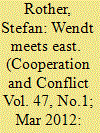

|
|
|
|
|
| Publication |
2012.
|
| Summary/Abstract |
The major theories of International Relations (IRT) differ significantly as far as their concepts of conflict and cooperation are concerned. However, they share one common denominator: They are deeply rooted in Western experiences and intellectual history. Recently, a growing literature on the possibilities and benefits of a non-Western IRT has emerged. This article proposes a 'via media': a theoretical approach that can be applied to Western and non-Western IR alike, taking into consideration the specific historical, ideational and cultural contexts. Based on social constructivism as developed by Alexander Wendt, it is argued that the existence of a collective identity among states in a given region can manifest itself in distinctive logics or cultures of anarchy. These are based on norms of conflict or cooperation that can be established through interaction, can be proposed by outside agents and localized, or can be affected by the re-negotiation of state identity caused by domestic events. In addition, there are cultural path dependencies: norms rooted in the cultural memory or consciousness of a region which tend to be ignored by interpretations that merely focus on current events or established Western models of cooperation. Area studies can contribute to provide this context.
|
|
|
|
|
|
|
|
|
|
|
|
|
|
|
|
|
|
|
|
|